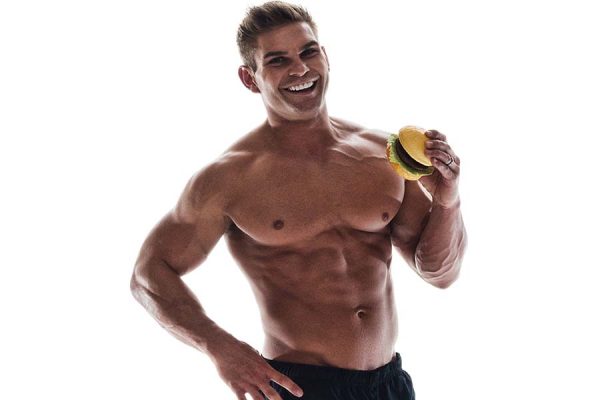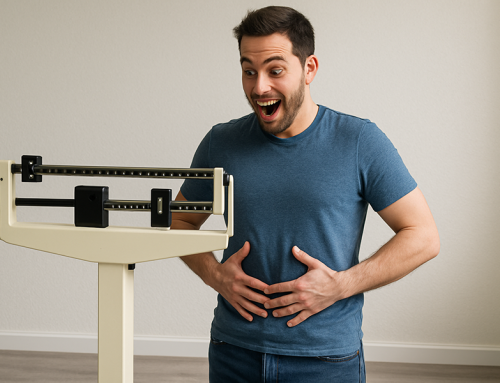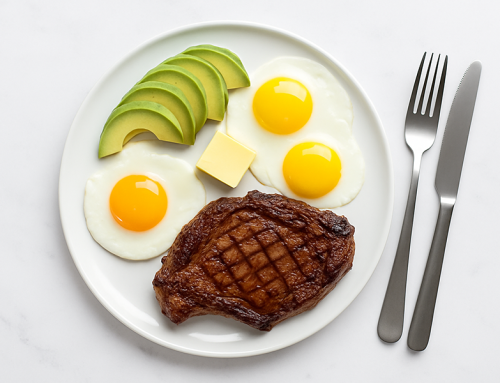A Calorie Deficit Is Required For Fat Loss
I often write books, articles and social media posts stating that a calorie deficit is required for fat loss. In all my messages, I emphasize the importance of understanding the energy balance equation, or as some people describe it, “calories in versus calories out” (cico).
When I make posts on this topic, invariably, someone (usually a calorie denialist or low-carb/insulin zealot) shows up in the comments and says something like:
“So, Tom, you’re saying that 1000 calories of pop tarts and Twinkies or 1000 calories of McDonalds is the same as 1000 calories of broccoli and chicken breast?”
While shaking my head and rolling my eyes I reply:
“Nice straw man. Read the post again. I said ‘a calorie deficit is required for fat loss.’ I said NOTHING about eating only pop tarts, Twinkies or Bic Macs in a deficit being a good idea. I said nothing like, ‘As long as it fits your macros, then you should eat anything you want.'”

Can you eat a burger occasionally and still lose weight? Of course. The key word is, “occasionally”
It’s Not (Only) About The Calorie Deficit
In today’s wild and wacky diet world, the second you put the focus on calories, some people assume that you mean the only thing that matters is calories, even though you didn’t say that at all. Why do so many people have this reaction?
Well, some people respond this way because they’ve been brainwashed by diet cults that insist calories don’t matter for weight loss. They believe that all you have to do is cut carbs or control insulin to lose fat. This is known as the carbohydrate-insulin hypothesis of weight loss. It’s a bunch of BS that’s been falsified by convincing research on low carb diets versus balanced macro or higher carb diets.
If anyone ever says, “reducing calorie intake does not lead to weight loss” that person is a quack. Run away as fast as you can.
Other people (who may be intelligent and sincere, not diet cultists), have this response because they believe in “clean” eating and the power of eating “real food.” They promote eating food that’s unprocessed and full of micronutrients, fiber and other good stuff. They believe this is vital for good health (which is true) and or that eating unprocessed food is how you lose weight (which is largely true, but not entirely, so hold that thought for a moment).
Still others believe that you have to factor in the macros – you can’t just talk about calories without talking about macros at the same time. Protein is especially important, and you need a balance between all three macros (carbs and fat as well). If you only talk about calories, these folks instantly reply:
“Oh, so you can eat 1000 calories of sugar (carbs) or eat 1000 calories of egg whites (protein) and get the same fat loss?
That’s yet another straw man. It’s also an unrealistic (stupid actually) comparison, because who in their right mind would suggest or practice either of those extremes?
The Truth About Processed Food And Weight Loss
If anyone has ever listened to my teachings about nutrition and fat loss, they know that what I’ve been preaching for three decades (without ever changing my tune) is that ALL of these factors are important:
- Calorie quantity
- Calorie quality
- Macronutrient balance
Nutrition is not an either or proposition: Food quantity OR food quality. Calories OR macros.
I’ve never said calorie quality and micro nutrition don’t matter. I’ve never said that macros don’t matter. Ive never said you should eat all the sugar you want because you can still lose weight if you’re in a calorie deficit.
I’ve said the opposite for years: Macros and food quality matter a lot – for health and for body composition. I’ve never said calories are the only thing or even the main thing. I’ve said that a calorie deficit is a requirement for fat loss.
The Health / Weight Loss Paradox
It helps you avoid confusion if you remember this: Eating for weight management and eating for health are two separate endeavors.
Health and weight loss overlap. This is especially true in the sense that when you lose weight it improves health markers such as blood pressure, blood cholesterol, triglycerides and blood sugar response.
These markers can sometimes improve because of the weight loss alone, regardless of which foods or macros were used to lose the weight.
This can confound a lot of arguments about which type of diet is healthier. Low carb groups claim their way is healthier, while plant-based diet groups claim theirs is healthier. Meanwhile, all along, it was the weight loss that caused most of the health improvements. Being obese is not healthy.
Health and weight loss are separate goals. However, when you look at them from a pure energy balance perspective (when you separate the discussion of weight loss from the discussion of health), you realize that weight loss is indeed all about the calories. This is explained in my Burn the Fat, Feed the Muscle (BFFM) book by the two corollaries of the law of energy balance:
- If you’re in a calorie deficit you will lose weight, even if those calories come from processed food.
- If you’re in a calorie surplus, you will gain weight, even if your diet is unprocessed food (or 100% “clean,” natural, organic, nutrient dense, etc).
Weight loss is a function of calorie deficit, not the source of the calories. Before you let that fry your brain because I also said macros matter (they do), or get you mad, thinking that I’m condoning eating lots of processed food (I’m not), please continue reading.
Why Eating Quality, Unprocessed Food Matters For Weight Loss
The type of food you eat can influence the calorie balance equation. One way is by affecting hunger and satiety.
If a food makes you feel fuller, you could say that food is ideal for weight loss, but not if you consistently eat those foods into surplus. Conversely, if a food is not filling or it actually makes you hungrier, you could say that food is not ideal for weight loss. But that’s not an issue if you have the restraint to abstain from eating too much.
If a food has a high fiber content, it’s low in calorie density, it has a lot of bulk and it requires a lot of chewing, so you have to eat slowly (like broccoli, asparagus or big leafy green salads for example), you could say those foods are ideal for weight loss. But not if you eat those foods while your overall diet is hyper-caloric (surplus).
A specific food can also influence what kind of weight you lose or gain when you are in a deficit or surplus, respectively.
You can gain muscle or fat (or both) in a surplus right? And you can lose fat or muscle (or both) in a deficit right? But in a perfect world you would want to gain only muscle in a surplus and only lose fat in a deficit. Your food choices and macronutrient ratios can affect that. So can whether you are weight training or sedentary.
For example, a diet with adequate high quality protein and essential fats will produce better body composition / more muscle than the same number of calories of all sugar. (Which is why no one with a brain recommends eating a large percentage of your diet from added sugars). And remember, amino acids from protein are essential nutrients. (Which is why no one with a brain would eat 100% carbs and no protein).
There’s even more: The type of food you eat can influence thermogenesis, as in the case of protein, which is more thermic. When you eat protein foods, your body can burn off up to 30% of those calories just to digest the food and assimilate the amino acids. So when you’re comparing different macronutrients, such as a high sugar diet (junk food/sweets) with a higher protein diet, you could legitimately in this case argue that “a calorie is not a calorie” and the protein-adequate diet wins every time.
However, if you look at the net effect after the food has been metabolized and if you control macro for macro or calorie for calorie for a fair comparison, and if you control all other variables, the law of calorie balance holds true: weight loss is a perfectly predictable function of calories in versus calories out.
For some reason, this idea doesn’t compute for some people. They figure that eating healthy, “clean” (unprocessed) foods must make you leaner. Well, they do in the sense that many of the unprocessed foods are natural lean proteins, greens and fibrous veggies, fruits and other foods that are high in nutrient density while lower in calorie density. The unprocessed foods are often high in fiber, they require a lot of chewing (can’t be drunk or “inhaled”), they make you feel fuller and they decrease hunger. I’ve just described what some people consider a “healthy fat loss food.”
Therefore, it would make great sense for you to make sure you get your calories right first – because without a deficit you simply won’t lose fat. But calorie calculations are only the first step. The next step is take that hypo-caloric (deficit) diet, portion it into an optimal balance of macros and fill it with the most nutritious foods you can. That will help keep you satisfied on your deficit, help your body composition results improve (fat loss while retaining lean tissue, not just weight loss), and help you stay healthy over the long term.
Why Eating Quality, Unprocessed Food Matters For Health
That brings us to the subject of food and health. The “clean eating” paradox also doesn’t click for a lot of people because they think that weight management and health are the same pursuit. As I mentioned earlier, they overlap, but they’re also separate. This may be easier to understand when you think about all the unhealthy ways people can lose weight or the way you can get fat eating 100% healthy nutrient-dense food – especially if you favor high fat foods, natural or not.
There are some interesting studies where the subjects were fed mostly sucrose (pure white sugar), but they were in a significant calorie deficit. Naturally, they lost weight just as predicted. In the controlled trials where the researchers literally dole out the food and the subjects are locked in a research ward (no cheating or mis-counting possible), weight loss in a deficit is always the result.
The researchers were in no way recommending an all-sucrose diet. Most nutrition organizations recommend limiting sugar to 5 to 10% of total calories. There were simply conducting an experiment on energy balance, sugar and weight loss.
It should go without saying that no one recommends a low-calorie 100% sugar diet for weight loss just because you can lose weight on 100% sugar. You can lose weight on 100% alcohol too. There are lots of skinny alcoholics out there, but they are also malnourished among other problems. But you don’t see us recommending the booze diet… (then again, some enterprising person actually did publish a “Drunk Diet” and low calorie alcohol is advertised for weight loss… sigh).
The Twinkie Diet, Subway Diet And McDonald’s Diet = Weight Loss?
There have also been some interesting anecdotal experiments on this subject of losing weight on a junk food diet in a deficit. For example, do you recall from the news, the nutrition professor who went on a self experiment called the “Twinkie diet?” He ate mostly Twinkies and snack cakes and he was meticulously certain to be in a calorie deficit. The outcome: he lost weight – but of course – he was in a calorie deficit. If you don’t take in enough energy, the energy required for your body to function has to come from somewhere.
But the “Twinkie Diet” professor also wasn’t trying to promote a low calorie junk food diet, he was trying to make a point – it’s the calorie deficit which is the pivotal point of causation for weight loss.
Nutrition Professor Loses 27 Pounds On Twinkie Diet
Other examples: The Subway Diet guy. Here’s a guy who ate nothing but fast food subs and lost weight. Meanwhile the geniuses at the subway headquarters changed their marketing angle to sell their food with a weight loss pitch… marketing brilliance. That campaign ran for years until the tight economy made them switch to $5 subs which was even more successful. (Also, the Subway Diet guy turned out to be a perv and was sent to jail. But I digress…)
Then there was Chazz Weaver – who created his own documentary film “Down Size Me” as a rebuttal to Morgan Spurlock’s documentary Super Size Me. Spurlock’s film made it into the mainstream doing millions at the box office. He filmed himself as he gained weight and got sick eating nothing but McDonalds for 30 days.
Weaver filmed himself as he ate McDonalds for 30 days – WHILE COUNTING HIS CALORIES. He ate at a calorie level appropriate for his body (a body that was weight trained and not sedentary), instead of eating “ad libitum” aka as much as he wanted. He also lifted weights. What do you think happened? That’s right, Weaver lost weight – 8 pounds – and he made quite a stir in the media showing off his abs and flexing biceps after his little stunt.
Weaver’s documentary made another point beyond the clean eating and calories in vs calories out debate. At the end of Supersize me, viewers spewed hate on McDonalds and fast food companies, saying things like, “If we don’t kill McDdonalds, McDdonalds will kill us.” Weaver said, “By shifting the blame from an individual to a corporate entity, Spurlock has really done a disservice to the American society.”
Some readers might be thinking, “These must be rare case studies and these guys were just freaks of nature.” But no. There are other examples. Take Kevin Maginnis. He dropped about 60 pounds in 100 days eating 100% McDonalds.
How you ask? Same way the Twinkie guy and Down Size me guy did: He controlled his portions so he was in a calorie deficit.
He was sure to eat only 500 calories per meal, and that was over 3 meals. Almost every man will drop fat pretty fast at 1500 calories per day.
Some other readers might be thinking, “Well, there’s no way you can be healthy eating 100% McDonalds.”
Actually he dropped over 60 points on his cholesterol, over 200 points on his triglycerides, and improved his HbA1c numbers.
You see, when you lose a lot of weight, your health almost always improves, regardless of which diet you’re on.
Do I think the Mcdonald’s diet or Twinkie diet is a good idea? Of course not. Over the long term, the effects on health would almost certainly catch up with anyone.
I’m not advocating for McDonald’s. I haven’t eaten McDonald’s food more than a few times in the last 30 years, that I can remember, and I’m no fan of fast food (though I happily admit I fit pizza and a good quality burger into my discretionary calories quite regularly).
However, there are lessons to be learned from these stories and documentaries. Merging the lessons of calories matter and so does personal responsibility, we could summarize:
Taking personal responsibility for both the TYPE and the AMOUNT of food you eat matters.
Calories In Processed Food
Now let me make an important point about the calories in processed food.
Generally speaking, fast foods and processed foods are calorie dense foods. So if someone says “sugar” or “fast food” or “soda” or whatever processed food you’re referring to “makes you fat” that’s not correct in the cause and effect sense.
Sugar, soda or fast food burgers do not automatically turn into fat if you’re in a calorie deficit (aka hypocaloric diet). On the other hand, sugar, soda and fast food usually end up being major contributors to the calorie surplus that is making people fat in our modern environment today.
Are you starting to disentangle and understand the causation and correlation yet? Once you do, from that moment forward, provided you act on your new understanding, you’re free from all dietary confusion.
Certain categories of processed food have become scapegoats for obesity, and with good reason. Soda is probably on top of the list right now. Soda is well known to be one of the reasons many people are in caloric surplus – they are drinking excess calories and (put a star by this) *they are not accounting for those calories.* The soft drinks are one of the main reasons they are in a calorie surplus.
And that is the key point: In the clinical trials, the researchers control the variables such as calories or the type of food eaten so they can establish cause and effect. Even in “Dr Twinkie’s” self-experiment, he counted his calories and knew he was in a deficit as evidenced by his losing weight.
But here’s what people who perennially struggle with body fat do instead:
- They don’t even know what their daily calorie needs are in the first place. They have no idea how much they should be eating to maintain or lose weight.
- They don’t track their calories or pre-plan their daily meals to the calorie, therefore, they leave themselves open to easily exceed their calorie needs, even if they know what the ideal amount is.
- They don’t trace their weight changes – gaining weight or losing weight – back to specific variables in their diet and exercise programs to try to connect the dots of cause and effect, so they never understand what’s working when there’s progress or what’s not working when there’s no progress.
- They underestimate how many calories they eat. This is a research-proven fact and some people under-estimate their calorie intake by up to 50% while ironically at the same time being the most vocal complainers that “its my metabolism” or “it’s my thyroid” and so on. Meanwhile, the cause of their weight gain was too many calories.
“Natural” food enthusiasts who don’t pay attention to calories, as well as the heavy processed food eaters who do track calories may both continue to have their own unique set of problems until this message sinks in. (And processed junk food eaters who are oblivious to calories are simply doomed).
This could lead into a great discussion (maybe a future post) about how adherence to your diet is critical, but there are two types of adherence:
1. Adherence to a calorie deficit
2. Adherence to eating mostly unprocessed foods.
But how much adherence is necessary?
Well, adherence to a calorie deficit is 100% mandatory for weight loss. No deficit means no weight loss.
But adherence to eating mostly healthy unprocessed foods at round 80% to 90% of total calories is reasonable and sustainable. This means that 10% to 20% of your calories can be anything goes. Some people call these discretionary calories or treat meal calories.
If you can adhere to these diet guidelines, then that is the answer to the question, “How can you eat processed food and still lose weight and also stay healthy?
Here’s a good way to wrap this up:
“Food quantity for weight management, food quality for health.”
Train hard and expect success!
Tom Venuto, The No-BS body transformation coach
Author, Burn the Fat Guide to Flexible Meal Planning For Fat Loss
Founder, Burn the Fat Inner Circle

Tom Venuto has been a trusted natural bodybuilding and fat loss expert since 1989. He is also a recipe creator specializing in fat-burning, muscle-building cooking. Tom is a former competitive bodybuilder and today works as a full-time fitness coach, writer, blogger, and author. In his spare time, he is an avid outdoor enthusiast and backpacker. His book, Burn The Fat, Feed The Muscle is an international bestseller, first as an ebook and now as a hardcover and audiobook. The Body Fat Solution, Tom’s book about emotional eating and long-term weight maintenance, was an Oprah Magazine and Men’s Fitness Magazine pick. Tom is also the founder of Burn The Fat Inner Circle – a fitness support community with over 52,000 members worldwide since 2006. Click here for membership details







Leave A Comment